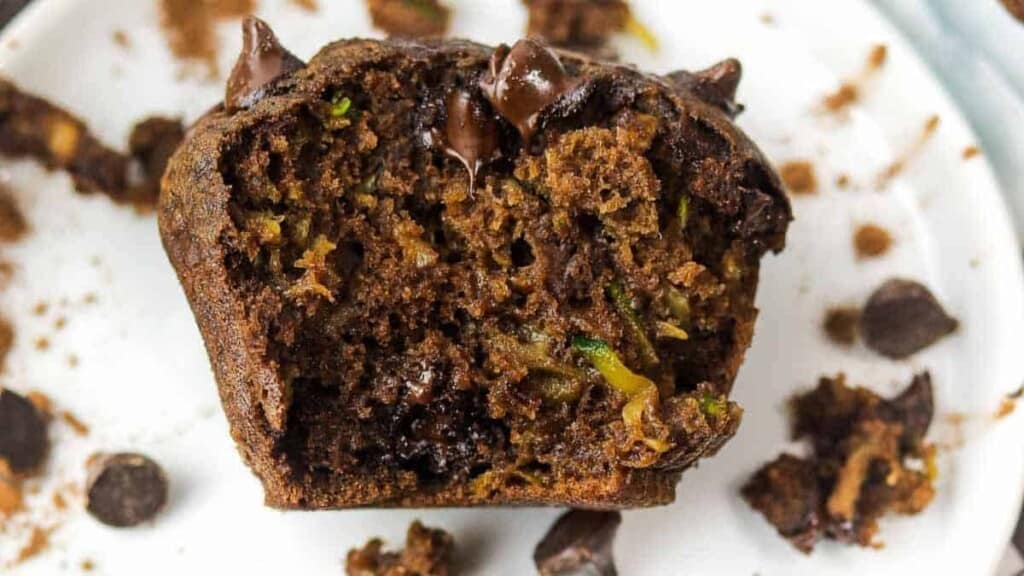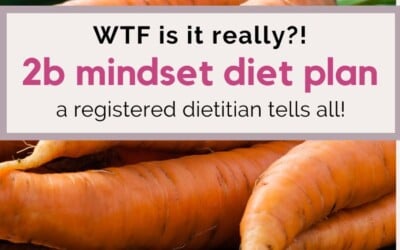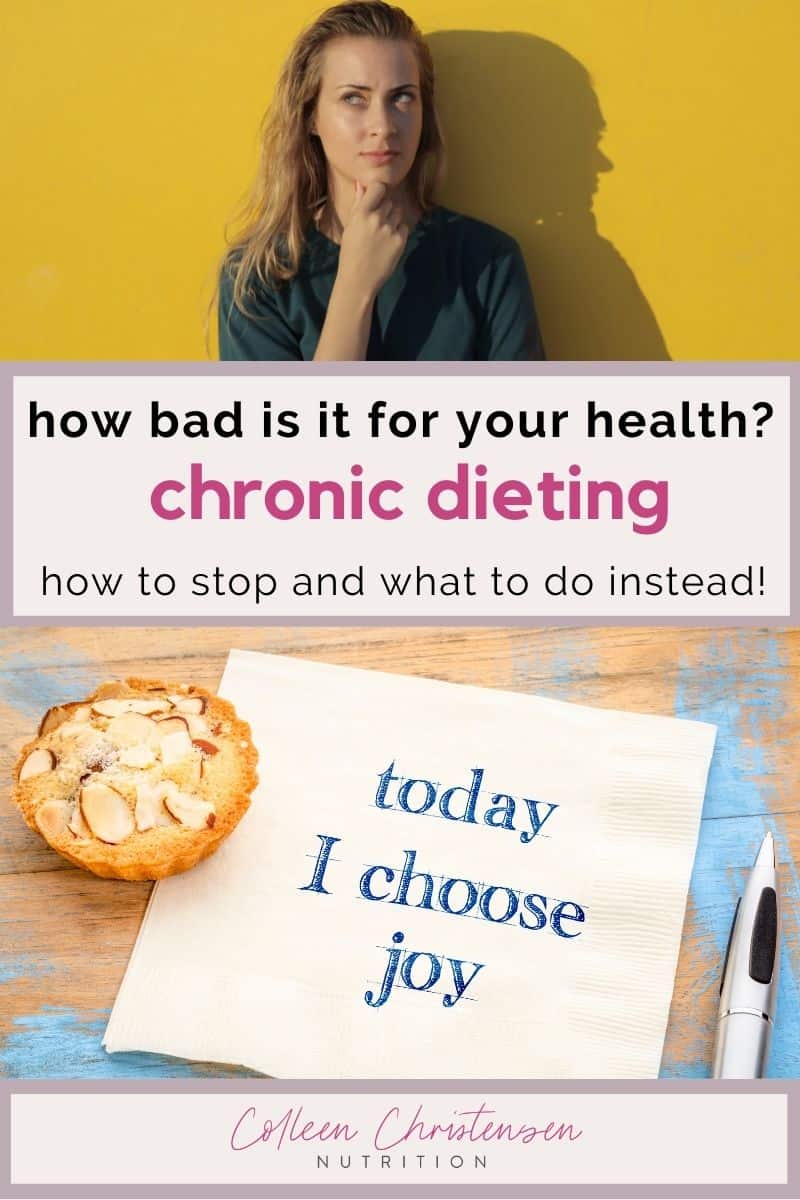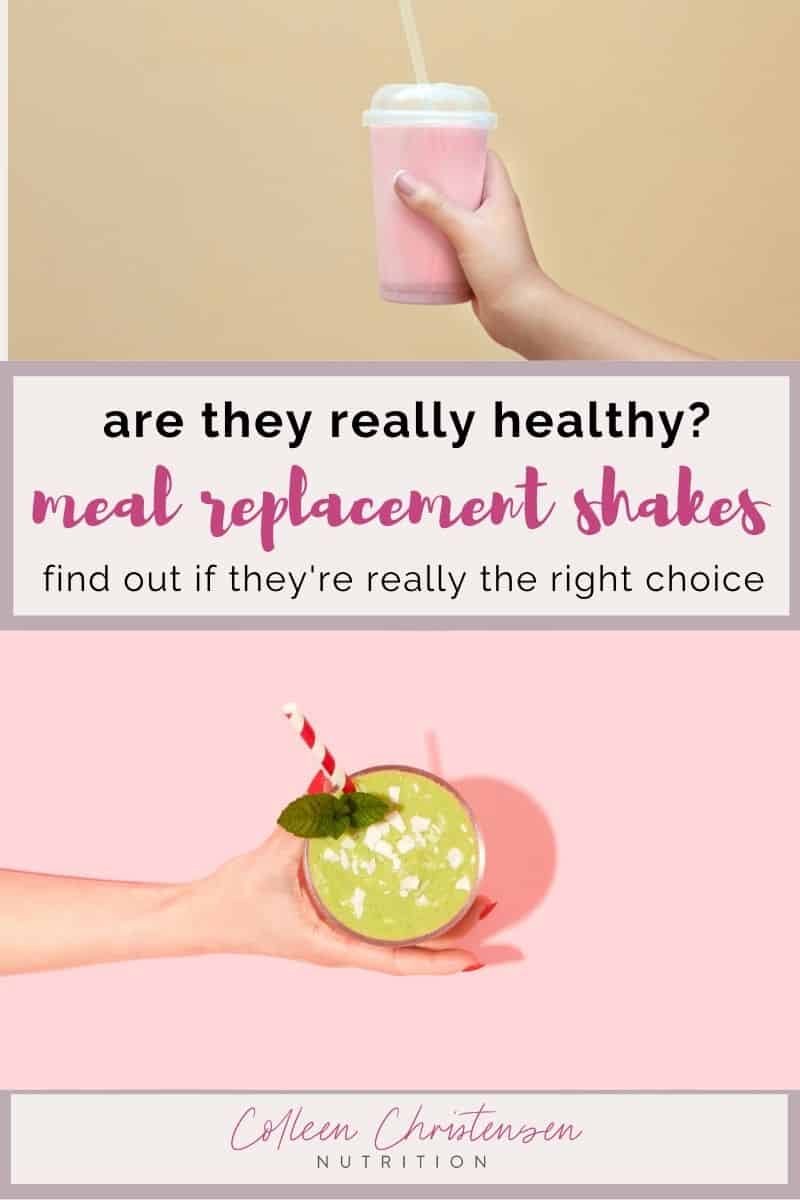If you’re like most people, you probably want to find an eating plan that is both healthy and easy to follow. And you may be aiming for weight loss. The 2B Mindset diet has been gaining in popularity lately, but does it really live up to the hype?
Today, we’ll be looking at this diet from the perspective of an intuitive eating dietitian. I purchased a membership to this program to kick the ‘ole tires on this thing. We’ll discuss what the 2B Mindset diet is, how it works, and my take on whether or not it’s a good option for those pursuing real health.
Stay tuned for our verdict!
If you’re new here – welcome! I am Colleen, an Intuitive Eating Dietitian. My community is made up of many ex-dieters who were sick of the same-ol-same-ol things not workin’ and they LOVE hearing my thoughts on common diets. This is one of many diets I’ve reviewed. These diet reviews are meant to help you make informed decisions and are in no means meant to discredit anyone’s beliefs. I’m simply sharing my take & recommendations! If you enjoy this post, be sure to check out the others that I’ll link towards the end.
Yes, Intuitive Eating (i.e. NOT dieting) is Healthy: you can bookmark this article to read next: Tell Me the Truth: Is Intuitive Eating Healthy?
Meanwhile, what is this 2B Mindset all about – and what’s my review?
What is 2B Mindset?
2B Mindset is a weight loss program created by Beachbody. It was created by registered dietitian Ilana Muhlstein. (P.S. I am also a registered dietitian).
The 2B Mindset is a program within the Beach Body company. Never heard of it? Beachbody is a Multi-Level Marketing company that shares exercise videos, and meal plans and sells shakes and other supplements. They’re the minds behind everything from the 21-Day Fix, Portion Fix, P90X and Shakeology shakes.
Beach Body has a few other nutrition programs that you may have heard of beyond the 2B Mindset diet that we’re reviewing here. There is 2B Pregnant – guidance for healthy eating during pregnancy with a focus on how to manage symptoms as well as boost nutrition. Beachbody also has a ‘gut healing’ protocol.
2B stands for – of all things – two bunnies. This is one of their main guidelines for eating. Let’s dive into their guidelines.

2B Mindset Guidelines
2B Mindset is designed for users to achieve weight loss without having to count points or even have a total calorie goal for the day…and it starts with two bunnies.
To explain this in one of the orientation videos, the program creator is holding up two fingers on each hand, looking like two bunny ears. Altogether, the program has four main pillars; represented by two “ears” on each bunny hand.
- Water first
- Veggies most
- Use the scale
- Track your progress
There are some definite pros to this diet plan…and some major cons. Let’s cover what the diet plan recommends and then I’ll give you my take on things.
Even though the creator of this plan is a registered dietitian – just like I am – we have different goals for our clients. I’ll explain.
Water first
The first principle of the 2B Mindset diet is to have 16 ounces of water before each meal and snack. While I am all about being hydrated, my thought is that this kind of recommendation can throw off our ability to listen to our true hunger and fullness cues by filling our tummies with non-caloric volume. Now while you might be thinking “cool! I’ll eat less?!” just know: this will backfire into you, likely winding up eating more later on.
Have you heard of volumetrics? We’ll talk about this in the veggie section in just a sec.
Recommendations for how much water we need daily differ depending on so many things but a good ballpark for the average woman is about 11.5 cups per day and for men about 15.5 cups. However, these numbers also include foods we eat that contribute water (up to 20% of those water needs) which brings the total daily amount needed to 9 cups for women and 12.5 for men.
Exactly how much you need depends on how much you’re moving, how hot it is, if you ate a salty meal, if you’re breastfeeding, and even what medications you’re taking. While it is nice to have a guideline, it is better to learn to tune into your body.
Water, even lemon water, is meant to hydrate your body, not to be used as a weight-loss tool. If you’re curious here are the Benefits of Lemon Water in the Morning According to a Dietitian.
Next topic? Veggies everywhere.

Veggies most
If you’re the 1 in 10 American adults who gets enough veggies regularly (without obsessively eating them!) – bravo!
The truth is that most of us could use more veggies throughout the week. But the purpose or intention that I recommend here is to boost health, not to lose weight. This is the difference in focusing on your behaviors instead of moving the number on the scale and is what makes my Intuitive Eating approach different from many of my dietitian colleagues. The reality is that weight loss does not always equal a healthier nor necessarily happier you.
As we continue our 2B Mindset review, the next “ear” on the bunny is veggies most at your lunch, dinner, and snacks (and naturally, 2B mindset makes it a bonus if you cram even more in at breakfast).
My take is that this is the idea that part of how our body reaches the message of fullness is because of stretch receptors in the wall of the stomach; kind of like the elastic in your waistband. More volume could equal more energy (aka calories) and so a physically full stomach could mean that you don’t need more energy.
But, this doesn’t really pan out.
Studies have shown that the volume of consumed food had a small and short effect on satiety. Meaning, that maybe you’ll feel full immediately but your body will quickly realize its faux fullness and the hunger will come in HOT. Like I said, our bodies are smart and they will know when they need more energy!
In her video about veggies, Illana explains that you could use an entire head of cauliflower to make 10 cups of cauli rice and have that instead of real rice. Holy bananas, Batman. Did you just hear yourself? 10 C-U-P-S of cauliflower rice? All I can think about is how much gas that would give me…
Instead of having a portion of food you love – rice, or pasta – you’re encouraged to cram your stomach as full as possible with veggies at the expense of the real day and pretend you’re satisfied? I don’t think so. This just makes it harder to control yourself around the real thing. Like eating alllll of the real chicken fried rice in 0.67 seconds or binge eating cookies after dinner because you skipped carbs. (BTW, we’ll get to the whole dinner thing in a second.) This restriction gets you further away from being in tune with what your body really wants, needs and what makes it feel good.
More veggies? Great idea. Heck, I can even get down with cauliflower rice- it’s a fun way to eat a veggie! You have permission to enjoy that. But cramming yourself so full of veggies you pretend that you’re full and satisfied at the expense of giving your body the true carbohydrates that it needs and wants? No thanks.
Next on the no thanks list? Daily weights.
The scale is your friend
“The Scale? We only hate it if we don’t go on it.” Oof, I disagree.
The 2B Mindset recommends daily weighing, first thing in the morning. Talk about setting the tone for the day – yikes!
On the one hand (bunny?), some research does illustrate that consistent weighing can contribute to weight loss. Here’s another example.
On the other hand, some (but not all) studies link daily weight checks and disordered eating.
But here is the real, most important, kicker: we can’t use your weight to assess your health. You can be healthy in a larger body, unhealthy in a smaller body, and vice versa. You can be healthy at any size (this is a movement called HAES. Check it out: Can You Really Be Healthy At Every Size? (HAES Explained!)
Many things can make our weight go up or down. What if you’re sick, feel like garbage, and don’t eat much for a day or two. Will your weight go down? Probably. Is this a healthy habit you should continue? Nope.
The reality is you can’t just decide what you want your weight to be and strive for that “goal weight”. Your body knows the best weight for you: it is called your Set Point.
Just like we all have different shoe sizes we all have different body sizes. We have SO much research to show that diets do NOT work and that pushing your body to a lower weight than it wants to be will lead to more weight gain in the long run. Instead, focus on how you FEEL not what you weigh. This is what I reach my clients to do in The SociEATy.
Plus, we tend to assume that our self-esteem will be better at a smaller size. Ain’t true. Body image is something that you can cultivate, starting right now.
Click here to find out how often I recommend weighing myself. Here’s a clue: I don’t own a scale.
If you have ever had a disordered relationship with food or your body it’s just not something I’d recommend doing.
Next up? Daily tracking.
Tracking
“If you eat it you track it.”
Using a pad of paper, an app, or whatever suits your lifestyle, you’re supposed to track each and every bit of food, cup of water, coffee, and silly carb (yes, that’s a thing in 2B Mindset – I’ll explain).
Tracking isn’t “bad” per se, but it is unnecessary, can lead to an unhealthy relationship with food and can be exhausting if you’re supposed to track every little bite until the end of time and can very often be the gateway recommendation that leads to disordered eating and a poor relationship with food. If you spent 15 minutes each day tracking your intake, that would crush more than 91 hours of your life over a year. I can think of far better uses of my time, such as participating in self-care.
Also, tracking your food (not necessarily even restricting but even just monitoring!) has been observed to raise perceived stress. This? Not so great for our health.
I do, however, think it’s important to get curious about how you feel after eating in certain ways. But no tracking is needed for this. Think about if you feel full after having a certain lunch? Do you have enough energy without a snack in the afternoon or do you get a burst of energy with a little something-something? This process of reflecting and evaluating is part of Intuitive Eating, which I teach and preach. I mean, learning how to feed your body in a way that feels good without wasting those 91 hours? Sign me up!
The idea of continuing to track everything forever is a lot.
And I don’t recommend it.
It is a recipe to feel shame or guilt about your eating habits and we don’t have time for that. You are a grown-up, you get to eat whatever you want, whenever you want, silly carbs be damned.
Okay: we’ve covered the two bunnies. Let’s chat through a few more of the 2B Mindset details and wrap up with our overall review.
All foods are allowed
With the 2B Mindset guidelines, they’re proud of the fact that all foods are allowed…to a point. I agree: you should be allowed to eat any food that you want, in any amount, at any time.
The difference between 2B Mindset and Intuitive Eating is that there are some major restrictions on how often and how much you’re allowed to eat the “fun” stuff. Enter: the silly carbs.
In the 2B Mindset program, they recommend limiting cookies, muffins, and other low-fiber, higher sugar carbs – the silly carbs – to small portions, say 100-150 calories worth as your splurge. If you want to know how many Oreos or blueberry muffins fit into 100 calories, the answer is not many.
Fiber is a really important nutrient that most of us are not getting enough of. Teaching folks to find naturally occurring fiber in healthy foods such as beans, oatmeal, and veggies is great. Demonizing other fun foods, ahem silly foods, is not great. It actually leads us to want to eat MORE.
Setting limits on food or even deeming them as “bad” or “unhealthy” can make us desire those foods more and then eat more of them when we do allow ourselves to have them. One study showed that dieters (those who would deem a milkshake “bad” or say that can only have so much) drank more of a milkshake VS non-dieters in the same setting.
Also, going back to that stress topic we chatted about in the previous section, restricting carbs (and also fat) in women has been shown to increase cortisol levels (the body’s stress hormone. Again, not great for our health.
PS: If you’re wondering, it is possible to have too much of a good thing, even fiber. I explain here: Fiber: How Much Is Too Much?
Emotional Eating
Illana shares openly her own struggles with emotional eating.
Ilana also shares that emotional healing takes time – I agree.
But she says that emotional eating is never okay – I strongly disagree.
Food can provide pleasure, comfort, and nutrition. We are allowed to enjoy, celebrate and take comfort from our food.
I cover this in much greater detail in a recent podcast episode, here: Your Go-To Guide for All Things Emotional Eating.
Breakfast
For breakfast, 2B Mindset recommends a high protein food (after 16 ounces of water) plus a high-fiber carb, such as oatmeal or whole-grain bread.
This is also an opportunity to plug the Shakeology shakes as a breakfast option. Can protein shakes be a part of a decision-free breakfast option? Sure. Do you have to have a protein shake in order to be healthy? Nope.
Seeking a gold star? Have veggies at breakfast.
There is nothing wrong with any of these things for breakfast. I often enjoy granola, yogurt, fruit and other things that are “approved” on the 2B Mindset.
I also enjoy (gasp) muffins, doughnuts and other “silly” things, as they’d say…sometimes the muffins are even chocolate, like my Loaded Chocolate Banana Zucchini Muffins. All foods can fit. And honoring my body’s hunger and cravings is how I got in tune with my body, and is what I help my clients to do in the SociEATy, too.

Lunch
Chug that water, girl.
After sixteen ounces of water, lunch continues with a whole lotta veggies, a little protein, and a fiber-filled carb (abbreviated as “FFC” in this program). For example, a turkey burger on half of a bun and turnips roasted into “fries”.
Again, these are great examples of nourishing foods that offer you long-lasting energy and a boost of vitamins, minerals and fiber. I can get down with that!
I just would like you to be able to have a side of something, even something “silly” without having to track it and feel shame for eating it, starting with a whole bun, if that is the right portion for you. And ya know what, some days you just want some mac n cheese with, like, no protein or veggies and that’s a-okay! Would I want to do that every day? No. Probably wouldn’t feel good. But is there any need for shame? Heck to the no. Intuitive eating gives you the permission to do this without guilt.
And next: a bathroom break, since you’ve had so much water to drink. And then, dinner. Maybe a snack…or maybe you skip that.
Snack
I’ll give you three guesses of what you should start your snack with.
16 ounces of water? Nailed it.
For snacks, you’re encouraged – again – you have a lotta water, more veggies…and mayyyybe a complex carb. If you’re desperate, maybe a hard-boiled egg.
You’re also encouraged to consider skipping the snack unless you really, really need it.
Friend, you’re allowed to have snacks without tracking and without shame.
Dinner
The dinner recommendations on the 2B Mindset are to start with water (obvi), and then have 75% of your plate vegetables and then 25% protein.
That’s it?
Most people don’t need additional energy at night, so there’s no need to have an FFC at dinner.
Fact: your body uses energy 24/7…carbs are OK at any time.
Ilana says: Remember, once you’ve finished eating, it’s “Dinner and Done” and time to move on with your night.
Fact: you’re always allowed to eat, even past 7 pm or 9 pm.
My thoughts? There are some really tasty-looking meals offered in their recipe guide and meal plan. But for me, and most grown-ass adults, it isn’t a whole lot of energy. And while they offer tips for eating this way over the holidays and at restaurants, you might feel limited, and then resentful, trying to follow these rules in your real life.
I see this whole no carbs at dinner recommendation to be a recipe for binge eating stale cookies in the pantry 20 minutes after eating your 10 cups of cauliflower rice. Speakin’ from real life here… Just eat the carbs to start with and in a portion that feels good to you. Your body does prefer to have carbs throughout the whole day.
So…is this a healthy diet? Do I recommend the 2B Mindset?
Review: Is 2B Mindset Healthy?
It isn’t just what you do, your intentions behind your actions matter, too.
It is kind of like when your siblings were forced to apologize after doing something jerky when you all were kids. Sure, the words were there – I’m sorry – but so too was the eye roll that your mom couldn’t see. You could sure as heck tell that the intention behind the words was missing.
Your intention around your actions matters. A lot.
Eating more veggies, drinking water, and focusing on whole grains are excellent habits to work on. In the Intuitive Eating space, we call this “gentle nutrition”.
But as an Intuitive Eater, I also know that working on those habits for the purpose of weight loss is not the same thing as true health and wellbeing. And that weight loss through dieting and food rules (which, yes, 2B Mindset IS a diet plan) is going to wind up just causing more weight gain in the long run.
Instead, I’d recommend learning to make peace with food, your body and to learn to listen to your body VS food rules because, the reality is, our bodies DO know best. We just gotta learn how to listen to them again. Which, you can totally do, gorgeous!
Bottom line: you can’t be your healthiest self if your eating choices are based on restrictions.
And since a common myth about Intuitive Eating is that it is just the “eat anything diet”, let me direct you to the post about gentle nutrition to explain how eating healthy foods is absolutely part of it. Check it out, here: Getting Started With Gentle Nutrition.
Other diet reviews:
The 2B Mindset is just one of many diets that I have reviewed for you. Ready to read more? Check out these other blog posts for the full scoop on the pros and cons of these popular fad diets:
- Bright Line Eating Review: Another Diet debunked
- What Is Chronic Dieting…and Should You Stop?
- Should You Follow A WFPB Diet?
- The Thermo Diet Debunked: Why Intuitive Eating is Better Long-Term
- Herbalife Weight Loss Products Review: Not Worth It
Key takeaways: 2B Mindset Reviews
Like most things, the 2B Mindset has some pros and cons.
I love that it is promoted by a registered dietitian and that it encourages more veggies and fiber-filled carbs. I love that all foods are allowed (mostly) and that it encourages hydration.
But for me the love stops there.
At the end of the day, it is another diet promoting weight loss. Weight is not a true measure of health or worth and most (like, nearly all) diets are not sustainable; meaning that the weight you worked so hard to lose will likely come back with some extra tacked on.
There is another way…and it is shown to offer you lasting health AND better body image. No shame and no tracking: this is Intuitive Eating. If you’d like to step off of the weight loss and regain rollercoaster, I invite you to check out Intuitive Eating. What Is Intuitive Eating? A Beginners Guide
It is really hard when we want to be healthy and want to feel good in our bodies. And we also want to enjoy our food.
Diets are such a big industry because they are alluring…”this one is different”… and “supported by an expert”…but the promises just don’t hold up over time. Before members join The SociEATy they think that they’re not dieting –- just “eating healthy” – when in fact, they’re burdened by a LOT of food rules. I invite you to test your eating habits with a quick quiz. Are you a healthy eater…or a closet dieter? Find out here.
Other Blog Posts You Might Like:
XOXO,
Colleen










Leave a Reply